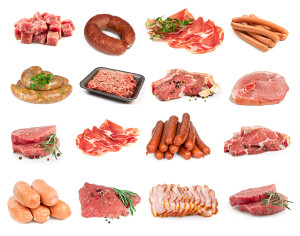Introduction
Risk factors for colon cancer and rectal cancer seem to go parallel. Fat plays an important role during the promotion stage of cancer development (=carcinogenesis).
A diet rich in animal fat and meat, but poor in fiber content is a risk factor for developing cancer of the colon and rectum. Seven Day Adventists and Mormons have a much lower colon cancer rate. They refrain from tobacco, from alcoholic beverages and follow diets that contain less saturated fat, less cholesterol and more fiber.
Conversely, Japanese who moved to Hawaii and adopted the typical American diet rich in cholesterol and fat as well as low fiber, developed a 2.5-fold greater rate of colon cancer than their relatives in Japan.
Apart from protecting against colon and rectal cancer fiber content in a diet has also beneficial effects regarding cardiovascular survival as this link shows.
Carcinogens in stool
Researchers have found other risk factors, namely fecapentaenes that are found in human feces. These powerful carcinogens (=cancer producing agents) are produced by the gut bacteria and are thought to play a major role for the development of colon polyps. High fiber food, vitamin C and others lower fecapentaenes in stool.
A high cholesterol diet (from a diet with excessive meat or cheese) leads to a metabolic breakdown to 3-ketosteroids, which end up in human stool. These compounds are cancer promoters and initiators and were found to be increased in concentration in stools of patients with colon cancer.
Excess saturated fat intake
Excess saturated fat intake is another risk factor that leads to increased bile acid production, which ends up in the gut where it induces proliferation in the lining of the colon. There is an unsafe free bile acid concentration, which was found to be excessive in colon cancer patients, but not in normal controls.
Another factor leading to colon and rectal cancer is alcohol consumption. If you consume 8 drinks or more per week your chances of coming down with colorectal cancer after 10 years double as this study showed.
Low calcium intake
Finally, dietary calcium intake appears to be important to bind free bile acids by forming insoluble bile salt complexes in stool. Colon cancer patients were found to have a tendency of lower intake of calcium; a low calcium intake is another risk factor.
While in North America physicians prescribed Premarin for menopause, in many other countries including Europe some women insisted on bio-identical estrogen replacement. These women were found to have only 50% of the risk of developing colon cancer over the past 50 years, particularly when this was combined with bioidentical progesterone (Ref.9).
Short telomeres and a lack of vitamin D3 can also lead to colon cancer as is described in this link.
More about risk factors leading to colorectal cancer: https://nethealthbook.com/news/colorectal-cancer-low-in-fish-eating-vegetarians/
Summary
In order to minimize the risk for rectal and colon cancer it is advisable to eat a low fat diet with reasonably small meat helpings (to reduce cholesterol intake). High fiber intake from salad, soybean sprouts, vegetables, wheat bran and fruit will bind the fecapentaenes and these foods are also pleasant to eat. If people like to take supplements, vitamin C, E and calcium supplements would be sensible( lowering of fecapentaenes). However, the diet described above will likely have enough of these vitamins contained in the food (also see Ref. 8). Irregardless of the progress in dietary prevention this is no guarantee against developing cancer of the rectum and colon. The physician needs to follow all the same preventative tests (stool for occult blood, colonoscopy etc.) as a precaution.
References
1. Cancer: Principles &Practice of Oncology, 4th edition, by V.T. De Vita,Jr.,et. al J.B. LippincottCo.,Philadelphia, 1993.Vol1. Chapter on Cancer of the colon.
2. Cancer: Principles&Practice of Oncology. 5th edition, volume 1. Edited by Vincent T. DeVita, Jr. et al. Lippincott-Raven Publ., Philadelphia,PA, 1997. Chapter 32, Section 7: Cancer of the colon.
3. The Merck Manual, 7th edition, by M. H. Beers et al., Whitehouse Station, N.J., 1999. Chapter 34, page 328-330.
4. S Srivastava et al. Clin Cancer Res 2001 May;7(5):1118-1126.
5. RF Holcombe et al. Cancer Detect Prev 2001;25(2):183-191.
6. S Kinuya et al. J Nucl Med 2001 Apr;42(4):596-600.
7. D Chen et al. IEEE Trans Med Imaging 2000 Dec;19(12):1220-1226.
8. B. Sears: “The age-free zone”.Regan Books, Harper Collins, 2000.
9. Dr. Uzzi Reiss on page 100 of: Suzanne Somers:”The Sexy Years; discover the hormone connection: the secret to fabulous sex, great health, and vitality, for women and men”, Three Rivers Press, NY, 2004.







